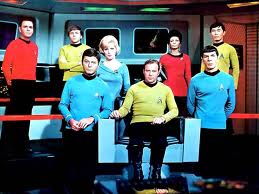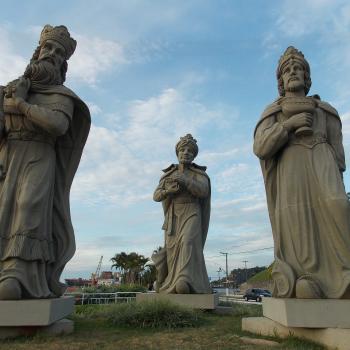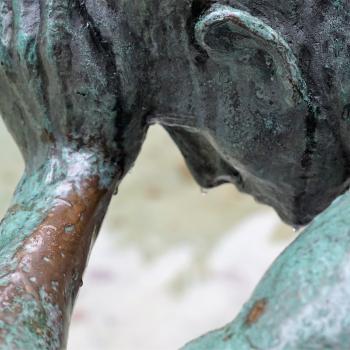 Any Star Trek fans out there? The Original Series? Do you remember the episode called “The City on the Edge of Forever”? No? Okay, here’s a short story, a blend of science fiction, mid-sixties silliness, and historical play:
Any Star Trek fans out there? The Original Series? Do you remember the episode called “The City on the Edge of Forever”? No? Okay, here’s a short story, a blend of science fiction, mid-sixties silliness, and historical play:
Dr. McCoy has passed through the Guardian of Forever, a portal into time and space that could take you anywhere. Captain Kirk and Spock need to rescue him and undo the historical damage he has done—something McCoy did has altered the past and thus threatened the entire timeline of human history. Kirk and Spock pursue McCoy through the portal, finding themselves in 1930s America, mid-Depression. There they meet Edith Keeler (played by a youthful looking…really…Joan Collins), who runs a mission in downtown New York.
Edith is lovely and gentle and passionate, and, of course, becomes smitten with Kirk. (All women [and other females that resemble humans but are another species], go gaga over Kirk. Always.] Kirk is also tumbling deep into the love portal, when suddenly Spock finds out what McCoy has done: McCoy had prevented a traffic accident in which Edith was “supposed to have been killed.” Instead she lived and initiated a pacifist movement that pressured the American government so powerfully that it delayed its entrance into World War Two, which in turn gave the Nazi regime time to develop the atomic bomb and thus win the war. (Yes, that would certainly have changed human history.) The episode concludes as Spock and Kirk reunite with McCoy and mournfully hold back from saving Edith as a truck runs her over. She had to die, and then the course of history is repaired.
[Now it would be interesting to go off on a tangent here and think about the meaning of a story like this in 1967 when it first aired. Sonny and Cher are crazy popular; Peggy Fleming is skating her way to glory, Wilt Chamberlain is a BB court phenom; Evel Knievel is trying on white spangly outfits; the Middle East erupts in the Six-Day War; civil rights protests and riots pepper America; Thurgood Marshall is confirmed by the Senate as the first black Supreme Court Justice; the Vietnam War is escalating with the planning of the Tet Offensive. What would it mean to play with the idea of changing history? What was Star Trek really doing?]
Everyone likes to play the “change history” game sometimes. We do it when we grieve—if only… We do it when we regret—shoot dang, what was I thinking? We do it when we look back nationally, culturally, politically—if we had known then… We fantasize about being smarter or wiser and therefore making better choices—better college majors, better career choices, better health decisions, better relationships, better whatever. Some people are caught in worm hole time warps in their own minds.
But Star Trek is just a diversion, a visible and simplistic icon of my “issue” with studying history. Tonight it’s triggered by this fairly innocuous and relatively common summarizing statement from a book I’m reading:
On September 8, 1380, a rebellious Russian army commanded by grand prince Dimitri II of Moscow met and defeated a large Mongol force at a meadow called Kulikovo on the upper Don, about two hundred miles south of Moscow. The battle was long and bloody, with terrible losses on both sides. (Sailing from Byzantium, p. 252)
What is it about that paragraph that is so troubling to me?
It’s those “terrible losses on both sides.” Unnamed, unknown, forgotten, irrelevant. Passed over in a few words in a book about important people, cultures, writings, battles. Sheesh, it was over 600 years ago. I’m mourning combat deaths from a Mongol-Russian battle a half a millennium ago?
Not mourning. Just wondering… about the weight of a life lived anonymously… about the little tweaky changes in history by one person’s smallest choices … about the value of an unnamed, twenty-something, Mongol man who might have gone on to do something momentous but instead was speared in the gut by a Russian—did he change history by conveniently dying?
Remember Otzi the Iceman, found in 1991 in Europe? This frozen mummy was of a man who had lived in 3300 B.C., died alone, and was quickly covered by ice. Lost, forgotten, unnamed. More than fifty-three hundred years ago. Did he have a family? Was he mourned? Did he matter?
Just wondering… about the worth of a soul … about the forgottenness of life … about the meaning of the very few years we live … about the significance of simply being, even for a brief time … do we change the course of history merely by our existence?
To study history is to study the remembered. Names, dates, events; battles, accomplishments, reigns; achievements, victories, relationships; leaders, commanders, thinkers, writers, artists. But what about the unremembered?
Did you know that my great-great-great-grandmother’s name was Belle? No. Of course not. No one living today remembers Belle. No one knows what she was like; what she did or said or felt or chose or believed. Belle matters to me, of course, because obviously if she hadn’t been around, I wouldn’t be around. But in the big picture? the timeline of human history? What does Belle mean?












